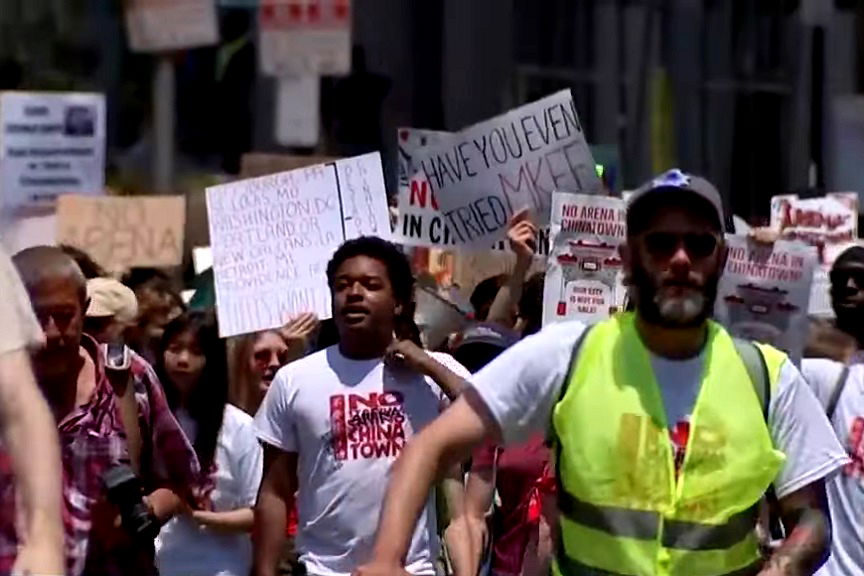76ers arena near Philadelphia’s Chinatown could cost over $1 billion in lost tax revenue: study


A new analysis of the 76ers’ proposed arena near Philadelphia’s Chinatown warns that the construction and operation of the arena could lead to over $1 billion in lost tax revenue for the city and state.
The analysis: The study, authored by Dr. Arthur Acolin, an economist and University of Washington associate professor in real estate, estimates potential disruptions to existing businesses in the area over a five-year construction period and 30 years of operation. The analysis estimates potential consequences, including the possible closure of 566 businesses, the elimination of nearly 16,000 jobs and a cumulative loss exceeding $1 billion in tax revenue.
Substantial negative effects: Existing businesses in the proposed arena area reportedly contribute over $296 million annually in taxes, a revenue stream that the researchers indicate is at risk due to the impact of 76 Place. The construction and subsequent opening of 76 Place have the potential to significantly disrupt the operations and survival of numerous existing tax-paying businesses, according to the analysis. This disruption could then have substantial negative effects on the businesses’ activities, their employees and the financial well-being of both the city and the state.
About the 76 Place: In July 2022, development company 76 Devcorp, which is headed by real estate developer David Adelman, proposed a plan to build the new 76ers arena at 10th and Market Streets near Philadelphia’s Chinatown. Developers are aiming for the arena’s construction to begin in 2028 and its opening in 2031 when the basketball team’s lease at the Wells Fargo Center expires.
The opposition: The proposal was immediately met with fierce criticism from the members of Chinatown, who are worried it would worsen limited parking, traffic congestion, gentrification, displacement and the loss of Chinese culture in the area.
In response, Adelman stressed the support of business groups outside of the neighborhood and offered to negotiate a community-benefits agreement that involves business opportunities. However, these were dismissed as propaganda for what critics view as a land grab. The opposition, who has since called for impact studies on the proposal, have expressed skepticism of previous and future examinations conducted by the city’s public-private economic development agency.
Previous impact studies: Dr. Acolin’s recent study points out that the Community and Economic Impact Studies, funded by the Sixers and conducted by Philadelphia Industrial Development Corporation, failed to account for the overall economic costs to existing small and mid-sized businesses, workers and the tax revenue they generate on East Market Street. While the Community Impact Study acknowledges potential hardships for individual businesses, it reportedly does not quantify the cumulative losses, leaving a significant aspect of the potential impact unexamined.
Call for alternative projects: Dr. Acolin urged officials to consider alternative projects that align with the existing tax base.
“Established taxpaying businesses and employees are an asset that could be dismantled if an arena is built,” Dr. Acolin said in a press release. “With such a high cost for building an arena, officials would be wise to consider alternative projects that invest and operate in synergy with the existing tax base, rather than jeopardize it. Local businesses and workers generate significant contributions to the local economy that are not easily replaced.”
“This study reinforces that 76 Place would be a monument to exploitation and come at a high cost to children, families, and taxpayers,” added Bishop Dwayne Royster, the executive director of grassroots community organization POWER Interfaith. “When arenas rise, wages for Black workers plummet and small businesses struggle. Lost wages for Black workers, the erasure of small businesses, and a loss of $1 billion in tax revenue will deepen existing inequity and harm the people who need the most and already get the least. The cherry on top is 76 Place’s willingness to take city tax breaks like a PILOT and state/federal subsidies—further proof that this arena would take far more that it claims to give to America’s poorest big city.”
Critics dismiss new analysis: However, critics, including 76 Devcorp and economist Stephen Mullin, have since dismissed the analysis, calling it “fatally flawed” and lacking “serious econometric analysis.” Mullin suggests that Acolin began with the premise that the arena would have a negative impact and then crafted assumptions to support that view.
A 76 Devcorp spokesperson also claims that the underlying research and citations of Acolin do not support the stated conclusions, criticizing the report’s lack of explanation regarding how they arrived at the data.
“This should be read for what it is: another attempt by those who oppose the project to obfuscate the truth by pumping out misinformation and half-baked theories instead of engaging in productive dialogue,” the spokesperson said in a statement.
City decision-makers are currently awaiting the city’s full impact study on the proposed arena before finalizing plans.
Share this Article
Share this Article






